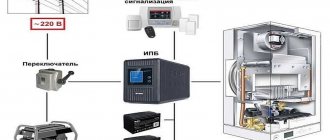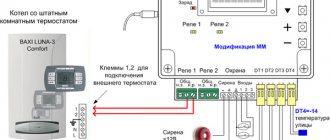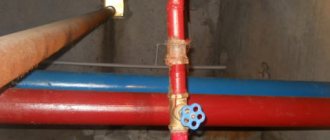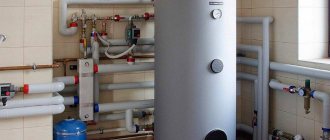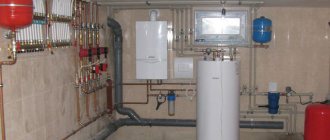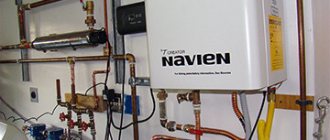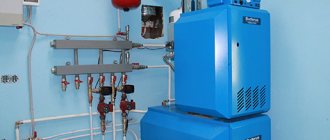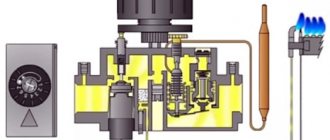Gas boiler maintenance must be done regularly. During the annual inspection, failures in the operation of automation, the safety of insulating materials, and the tightness of components and pipes are identified. This ensures the safety of the equipment and achieves savings by fine-tuning the gas flow. In this material we will talk about the actions that need to be performed for proper prevention of a gas boiler. Let's look at the example of a wall model. Most often, it is wall-mounted boilers that require detailed maintenance. The following maintenance steps can be defined:
- shutdown of gas, water and electricity
- coolant drain
- turbine maintenance
- cleaning the heat exchanger
- cleaning gas burners and electrodes
- boiler cleaning
- checking the expansion tank
- checking flow sensors and filters
- gas pressure adjustment
- connection and testing
Turbine maintenance
Gas boiler turbine
The exhaust fan ensures proper removal of carbon dioxide, soot and smoke after combustion of the gas mixture. After dismantling the fan, it is worth checking the chimney pipe leading to the street for clogging. The fan must be cleaned of dust and the shafts lubricated. The condensate collector leading to the turbine must be sealed.
Cleaning the gas burner chamber and heat exchanger
gas boiler burner
After removing the cover, clean the outer fins of the heat exchanger from combustion products with a coarse brush. A well-cleaned heat exchanger ensures uniform heating of water or other coolant and prevents local overheating.
Using a soft copper brush, you need to remove any remaining soot from the ignition electrodes and ionization sensor, which are located in the chamber, and wipe them with isopropyl alcohol. Finally, you need to check the gap from the electrode to the burner, which should be about 4 mm.
What is the difference between cleaning single-circuit and double-circuit boilers?
Mainly by volume: cleaning gas boilers with a primary heating circuit takes less time and effort. It includes maintenance of all components and components, including the firebox and chimney. The last 2 elements are also found in double-circuit boilers. Cleaning the firebox and sectional chimney is not difficult for those who independently service household appliances: contaminants are removed mechanically.
The normal functioning of the unit, or more precisely, its performance and stability of operation, depends on the condition of the chimney. The automation of modern heating boilers necessarily includes a draft control sensor; in its absence, the start of the burners (ignition) is blocked. Therefore, it is very important to keep your chimney clean.
Chemical descaling
gas boiler heat exchanger
There are operating conditions (they are indicated at the end of the article) under which it may be necessary to service a gas boiler in the form of cleaning the heat exchanger from scale. In this case, the supply pipes are unscrewed and the entire heat exchanger is dismantled. For chemical cleaning, it must be filled with a solution of hydrochloric acid, which dissolves blockages. After 10-15 minutes, drain and rinse with running water. If during washing there are still difficulties with the passage of water, the cleaning process should be repeated.
What is checked during maintenance
This procedure includes a number of complex technological operations. What exactly will need to be checked when servicing gas equipment in a private home?
Using gas analyzers, technicians monitor the tightness of the pipeline, without relying on their own sense of smell. The inspection is subject to checking the operability of the equipment, that is, its technical condition in all modes that are provided. They are interested in the degree of wear of all components and their suitability for subsequent use. To do this, the equipment is subjected to complete or partial disassembly and inspected in order to identify signs of resource depletion.
The readiness of protection systems can be checked by making them operate under conditions simulating various emergency situations.
Adjusting the pressure of the expansion tank
During the production of a gas boiler, nitrogen is pumped into the expansion tank, but during operation, manufacturers are allowed to pump it with ordinary air. An expansion tank is necessary to compensate for excess pressure that occurs as a result of heating and cooling of the coolant. In addition, it has the function of protecting against water hammer in the heating system.
To completely prevent a gas boiler, you need to measure the pressure in the expansion tank using a pressure gauge. For most wall-mounted boilers, the pressure required for operation is 1 bar. The exact numbers need to be clarified in the documentation for the boiler. In the event that the pressure is insufficient, it is necessary to pump nitrogen or atmospheric air into it using a compressor. In case of excess pressure, it is necessary to bleed off the excess through the valve.
Why us?
You can completely trust our specialists to repair and service boilers. We have been working in this field since 2003 and pride ourselves on fast and high-quality servicing of heating boilers.
We travel to any district of Moscow and the Moscow region, and also, by agreement, to other regions on the day the application is accepted and work seven days a week.
We are representatives of most manufacturers and can carry out maintenance of all brands of boilers, and we also have all the spare parts for them.
Our company’s specialists are certified and have permits; the entire range of work will be insured and confirmed by a warranty period.
Call us now and you will be satisfied with the price and quality of services!
Cleaning filters
Incoming filtering is necessary. If water is used as a coolant, the flow often contains fine sand, silt, scale, rust or metal shavings. Dirt entering the system can disrupt the operation of the input flow sensor, clog the heat exchanger, etc.
The filter and flow sensor are cleaned using ordinary running water and a brush with hard bristles. Next, before reinstallation, to soften the O-rings that prevent leakage, they need to be treated with silicone grease to achieve a tight connection.
Some useful tips
Remember that, as in any area of service delivery, there is a phenomenon called unhealthy competition. It is customary for organizations to win over clients, taking advantage of the public’s lack of awareness of technical issues and sometimes even resorting to intimidation. If you have an existing document that is not expired, it makes sense to call those with whom you currently have a contract for servicing gas equipment in a private home (the gas technicians’ telephone number should always be at hand). You will inform them about the visit of competitors and new offers.
Sometimes representatives of the service department put forward more than persistent proposals to renew the contract due to the increased cost of servicing gas equipment in a private home. Often this phenomenon can be found in rural areas, where the population is much less informed. You should not fall for such actions. As long as the document has not expired, any prices remain the same (they should not be confused with gas supply tariffs).
Sometimes you can hear about the substitution of the concepts of maintenance and repair. According to the contract, the owner’s obligation is to pay only for maintenance (we are talking about a visit from a technician and minor work related to diagnostics, cleaning, flushing, etc.). If the issue of troubleshooting is raised, especially with the replacement of spare parts, then the procedure is subject to separate payment.
Gas pressure adjustment
Measuring and adjusting the minimum and maximum gas pressure will not only achieve proper operation of the boiler, but also save money. The exact pressure range is indicated in the instructions. For wall-mounted boilers it is at least 2 mbar. The maximum pressure is 13 minibar.
If there are no errors, start the gas boiler and open the gas valve. Using a differential pressure gauge, we measure the minimum gas pressure in the system. To measure the maximum possible pressure, turn on the boiler in the “chimney sweep” mode and check the pressure in this mode. If necessary, adjust the pressure to the specified values.
No amateur performances!
At first glance, the above list does not contain anything particularly complicated. It may seem like a job that any homeowner can do. But this impression is very misleading. An inexperienced person may miss the smallest signs that the boiler, water supply and gas pipeline do not meet strict requirements.
In the event of an unforeseen situation, not everyone is able to quickly respond in order to prevent irreparable consequences. At the same time, the specialist not only has the necessary qualifications and experience to carry out such work, but also bears personal responsibility for the quality of the inspection. This is confirmed by his signature on the documents for the boiler, which you must require from him upon completion of the maintenance.
The importance of correct gas pressure setting
When the pressure drops below acceptable values, the boiler automation is not able to accurately regulate the heating temperature and operates at maximum values. The electronics opens the maximum pressure and heats the boiler to the required temperature, but due to insufficient pressure, it is impossible to maintain the desired temperature. The automation shuts off the gas and, after reaching the minimum allowed temperature, again heats the boiler to the maximum in the maximum possible mode.
If the gas pressure exceeds the rated values, the flame height is too high. This can lead to premature burnout of the heat exchanger, which is not designed to operate in this mode.
Compare this with normal operating mode, in which the temperature is gradually brought to the required values, and then maintained at a minimum gas flow. In this case, gas consumption decreases due to the smooth dynamics of heating and cooling.
What else is important
Having good specialists who can assemble and disassemble a unit and identify faults is not enough. Sometimes you can’t do without complex and expensive equipment - some of the work on servicing gas equipment in a private house cannot be performed “on site”.
For example, we can talk about cleaning the internal cavities of heat exchangers. If your device is under warranty, inquire about the right to organize maintenance during this period. You should also be interested in the time frame in which requests are completed and warranty periods after repairs.
It would also be useful to collect feedback from people who have experience working with this organization. Also important factors are the price of servicing gas equipment in a private home and the list of services that are free. Before making a choice, it will be useful to compare the conditions with those accepted in other organizations.
Is it necessary to chemically clean the inside of the heat exchanger?
Under normal operating conditions, no. The service life of the heat exchanger is about 6-7 years and after this time it is easier to make a preventive replacement. Annual dismantling and reinstallation will only increase the risks associated with possible destruction of connections and the risk of subsequent fluid leakage.
However, there are reasons why annual chemical cleaning may be worthwhile. This is very hard water that contains too many mineral impurities. A layer of scale builds up too quickly in the heat exchanger. Because of this, difficulties arise associated with insufficient heating of water. During prolonged operation under such conditions, the heat exchanger generally stops passing enough liquid, overheats, burns out, and the boiler fails.
How often does the boiler need to be serviced? Regularity of prevention
A gas boiler inspection must be carried out at least once a year, before the start of the heating season. Why is regularity necessary when servicing gas boilers? The answer is simple, it is necessary for reliable and uninterrupted provision of hot water. Let's try to figure out what can happen if you don't carry out an annual inspection of your gas boiler.
- Over time, the connections become more and more fragile, the insulating materials exhaust their service life and cannot provide a sufficient degree of sealing. This applies to both coolant and gas.
- Excess dust and fumes on the turbine impeller lead to wear and premature failure.
- Insufficient or excessive pressure in the expansion tank leads to sudden pressure surges, which leads to the destruction of connections, seals and hydraulic units.
- A dirty filter may cause the water supply to stop. Also, poor filtration leads to clogging of thin tubes in the heat exchanger. If dirt gets into the water flow sensor, the boiler will not turn on when the hot water tap is opened.
- Incorrect gas adjustment leads to burnout of the heat exchanger, failure of the Venturi nozzle or excessive gas consumption. Over time, the pressure in the gas pipe changes and only annual pressure adjustment can ensure that the pressure corresponds to the specifications.
Pay attention to your gas boiler, do its maintenance and preventive maintenance, and then it will serve you for a long time
average cost
Service centers usually provide the following cooperation options:
- One-time visit to inspect and repair the boiler, diagnostics.
- One-time maintenance of equipment during the first start-up or before the start of the heating season.
- Annual service, including preparation for the heating season, optionally scheduled visits for inspection and diagnostics, as well as a prepaid visit in case of breakdown.
The cost of each type of work includes payment to the employee, payment to the service center, as well as overhead costs. If the first two aspects are approximately the same across regions and depend on the boiler model, its power and manufacturers, then overhead costs often vary significantly. This depends on the distance between the service center and the client, working conditions, the number of specialists in the center and many other factors, which introduces a wide range between the price tags of different service companies.
The table shows average prices for various types of work depending on the power of the gas heating boiler.
| Name of works | Boiler power | ||
| up to 20 kW | up to 40 kW | up to 100 kW | |
| One-time visit, diagnostics and repair, if the fault can be fixed on site | 3000-5500 | 3000-5500 | 3000-5500 |
| One-time maintenance, routine maintenance before the heating season | 4000-6000 | 4500-6000 | 5000-7500 |
| Annual service | 4500-7500 | 6500-9000 | 12000-16000 |
Basically, the table takes into account the servicing of imported gas heating boilers by service centers with the appropriate certificate from the manufacturers. Domestic boilers, both to purchase and to maintain, are cheaper; spare parts are easier to find and replace. However, their main feature is simplicity and unpretentiousness, so you can’t expect comfortable heating or extensive functionality from them, or, in fact, trouble-free service.
